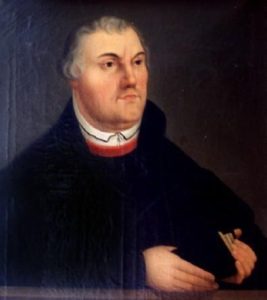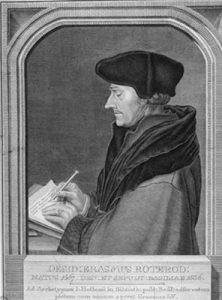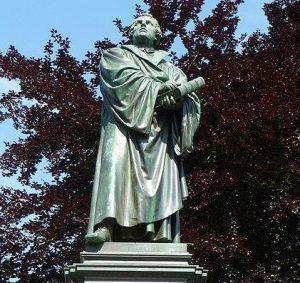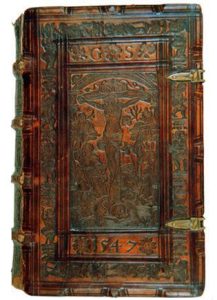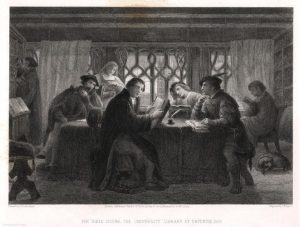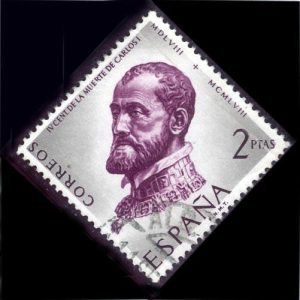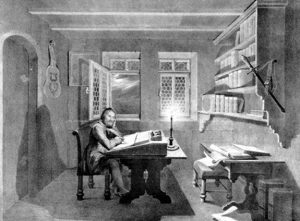Troubled times
Towards the end of the Middle Ages, different evolutions, among which the propagation of trade transactions and their geographical expansion, largely contributed to transmutations in social life and relationships.
The trading bourgeoisie became more influential while some princely families underwent a questioning of their authority. Peasants felt their status was worsening under serfdom. Various uprisings took place which were often very violent, such as the Knights’ war, the Peasants’ war or the Anabaptist’ revolt in Münster.
Those who rebelled against injustice asked Luther to publicly stand by them. The reformer proved in his teaching and sermons that he was concerned by these difficulties. But his standpoints were not always what was expected by the protagonists who sought his open support for their cause.
The fight against the secular power of the Church: Address to the Christian Nobility of the German nation
In 1520, Luther wrote an appeal to the princes urging them not to submit to the dignitaries of the Church. He asked them to take up and bear their responsibilities. They should thus implement justice, ensure the maintenance of schools and teaching; they should also promote the development of trade. He asked them not to levy any ecclesiastic taxes to doubtful ends. This recommendation was effectively applied to the tax the Pope wanted to levy to support the armies of François the Ist, who had come to fight those of Charles V.
The Peasants' war
In 1524, the peasants who wished to overthrow serfdom and some taxes, instigated a dramatic uprising. One of their leaders, Thomas Müntzer was a former monk who had become a pastor, then an Anabaptist pastor. His appeal was mostly based on the hopes raised by Luther’s teachings and struggles. Keen to takes sides with the peasants against the nobility, Luther eventually refused his support to their cause.
He was certainly not unconcerned. He obviously tried, in different writings or talks, to moderate the different parties – the peasants as well as the nobility. But the peasants felt betrayed, even more so as the ensuing oppression after their demise was a bloodshed. Luther’s attitude in the conflict seemed disappointing and historians often blame him.
The rejection of Jewish communities
In the 1530s, the Elector of Saxony prince John the Steadfast, wanted to drive the Jewish communities out of his jurisdiction, on quite arbitrary pretenses. One would have thought that Luther was outraged by such a decision and would have tried to prevent it. Not only did he do nothing, but Luther encouraged the Prince in his iniquitous decision.
The relationship between Luther and the Jewish community was certainly not simple. Catholic education in those days was infused with anti-Semitism, based on the notion of the deicide people. When translating the Pentateuch from the original text, however, Luther seems to have freed himself from these prejudices, as witnessed by his writings of 1523, That Jesus-Christ was born Jewish. A scholarly and friendly dialogue had already developed between the Jewish community and him. But one ambiguity was left unsettled: the reformer hoped that his work would, sooner or later, prompt a conversion of the Jews to Christianity. He was bewildered, blinded and resentful of the Jewish community’s reasserted independence.
The Doctrine of the two Kingdoms
Luther’s theological attitude, claiming that salvation was given through God’s grace and not through deeds, referred crucially to chapter 13 of the Epistle of Paul to the Romans. He made a difference between what befits the judgment and the government of men and what befits the judgment and the kingdom of God. This difference was often understood in a very restrictive way: it would encourage the Christian’s interiority, deemed essential, and would incite a passive attitude towards the social order, supposedly requested by God. Many believe that it was Luther’s point of view, as on several occasions, he indeed rallied to the cause of the Princes often detrimental to justice.
Some of Luther’s stances may have caused these misunderstandings : I am and always want to take sides with the victims of the uprising, though their cause may be wrong. I am opposed and always want to be opposed to those who resort to violence, though their cause may be just, because an uprising cannot end in shedding innocent blood. (quoted by Albert Grenier, Luther, essai biographique, Paris, 1956, p 119)
It would be difficult to leave it at that:
-
- the doctrine of the two Kingdoms, which Luther developed in his Commentaries on the Epistle to the Romans did not lead to blind submission to princes, but above all to critical thinking: no secular power can pretend to be of divine right, and act in the name of God.
- In his Address to the Christian Nobility of the German nation Luther promoted critical thinking on the way the city is governed.
In the 20th century, the Lutheran pastors who took part in the synod in Barmen in 1934, and were committed to the confessing Church, such as Martin Niemöller, Dietrich Bonhoeffer and many others, had fully understood: Nazism had to be fought and they did not shy away.


